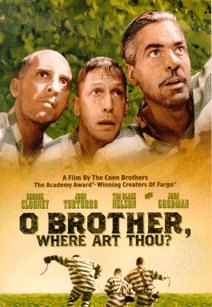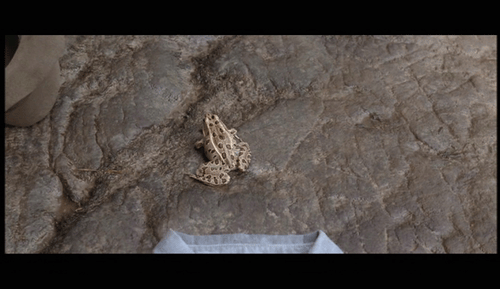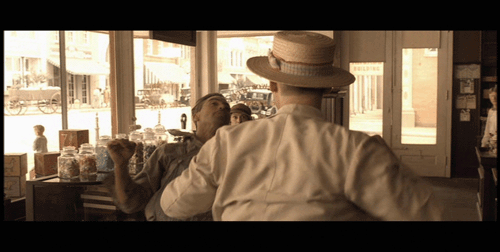
CINEMATIC ALLUSIONS TO LITERARY WORKS
O BROTHER, WHERE ART THOU? (2000)

Joel and Ethan Coen have overtly billed their 2000 comedy O Brother, Where Art Thou? as based on Homer's Odyssey. Using cars and trains where Odysseus and his men used boats and rafts, they engage with the theme of a man's love for wife and home and his determination to return there against all odds. The law and the penal system substitute for war and the gods as escaped convict Ulysses Everett McGill and his companions dodge all manner of obstacles to return to Everett's home town in time to prevent his wife Penny's impending remarriage.
Set in depression-era Mississippi, the film relies to a considerable extent on oral communication, evoking the era of Homeric epic when few could read or write. Political candidates compete on the radio and have back-up bands at rallies, one of which turns out to consist of Everett's young daughters. Perhaps the most significant singer of all is Everett himself, who ultimately reintegrates himself into society and restores his stature with his wife by his powerful (and marketable) singing. The power of persistence, longing for home, and centrality of music to love and life link the Coens' epic inextricably with that of Homer.
Jennifer T. Roberts, Ph.D.
Professor, Foreign Languages and Literature
O Brother, Where Art Thou? Dir. Joel Cohn. Perf. George Clooney, John Turturro, Tim Blake Nelson, and Holly Hunter. DVD. Touchstone Pictures and Universal Pictures in association with Studio Canal, 2000.
 |
The seeming metamorphosis of Everett's (George Clooney) companion Pete (John Turturro) into a toad after Everett, Pete and their sidekick Delmar (Tim Blake Nelson) have spent an "enchanting" night with supremely seductive women billed overtly as "sir-eens" whom they found singing as they washed their laundry by the rocks. In truth, Pete has simply been seized by pursuing lawmen, but Delmar is convinced he has been transformed. |
The theme of metamorphosis is common in classical literature, and the siren episode is blended here with the tale Homer told in Book 10 about the encounter of Odysseus' men with the witch Kirke: On thrones she seated them, and lounging chairs, |
|
Everett (George Clooney) fighting in Woolworth's with Penny's (Holly Hunter) fiancé Vernon Waldrip (Ray McKinnon), as Penny looks on both horrified and impressed. The need for the hero to engage in physical combat to reclaim his home is a common one in world literature. In the Odyssey, Odysseus triumphs over the suitors who have been eating him out of house and home and pressuring his wife Penelope into marriage, proving himself by stringing his old bow and shooting an arrow through a series of axes. |
 |
|
Together with his son Telemachus, he then slays all the evil suitors despite the numerical odds. In the Coen brothers' comic rendition, Everett's first encounter with Penny's fiancé ends in a fistfight in which Everett very much gets the worst of it and is thrown out of Woolworth's with the caution never to return, but Homer's Odysseus was more successful: But the man skilled in all ways of contending, |
|
 |
Everett (George Clooney) using disguise to win reintegration into the community as a singer. As escaped convicts, Everett and his buddies disguise themselves to gain access to a stage on which they can perform rousing music that they know will endear them to the audience and even the government. As Everett speaks, his beard bobs up and down, enabling his estranged wife Penny to recognize him. The interplay between disguise and recognition is central to the Odyssey. At the end of the poem, Odysseus, his disguise as a beggar aided by ample use of matted hair, infiltrates Penelope's home. |
In the film, although she has encountered him before (at the store, where he fought with her fiancé), it is only in this scene that Penny recognizes the marketable musical skills that make Everett a socially acceptable husband. |
|
Bibliography
Carr, Jay. "'O Brother' A Paean to Americana." The Boston Globe 29 Dec. 2000: DI.
Ebert, Roger. "Great Parts Don't Add Up to Great Film." The Seattle Times 29 Dec. 2000: G25.
James, Stan. "Brothers' Runaway Odyssey." The Advertiser 30 December 2000: M15+.
| Previous Movie | Return to main page | Next Movie |
Copyright © The City College Library www1.ccny.cuny.edu/library |
||